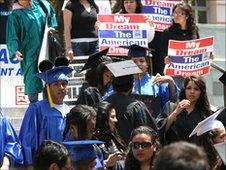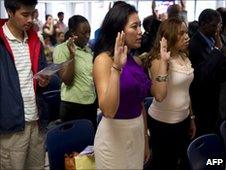Hispanics in the US: Generation 1.5
- Published

Campaigners want the legal limbo of young immigrants resolved
Meet Generation 1.5.
They were brought to the US at a young age by the parents, first generation immigrants who often still have close ties to their home countries.
Younger brothers and sisters were born in America, second generation immigrants who enjoy the status of US citizens.
Not Generation 1.5. Despite having lived most of their lives in the US and speaking fluent English, many cannot legally work, vote or drive in most US states.
They are subject to arrest and deportation just like any other undocumented migrant.
"They fear being deported but many of them don't know (anything) other than English, so they have no idea what awaits (them) in their countries of origin, said Ruben Rumbaut of the University of California in Irvine, who coined the Generation 1.5 term.
There are no official figures of how many undocumented children live in the US, but the Pew Hispanic Center estimates that 7% of all Hispanic children are unauthorised immigrants.
This suggest there are 1.1 million Latino children who are not US citizens.
Children can attend primary and secondary school without being asked about their immigration status, but getting through higher education can be more difficult.
It is estimated that approximately 65,000 undocumented students - both Hispanic and non-Hispanic - graduate each year from high school.
In all but 11 states, they cannot qualify for in-state college fees or student loans, meaning they have to pay the higher rates demanded of international students.
American dream
Life after university can also be complicated, as finding a legal job may be difficult.
"I held the very American view that if you work hard for your dreams you can achieve them," said Gabriel, 28, an undocumented student who lives in California.
"The only way is through marriage, which is frustrating for someone who was taught to be successful using their own ways," he said.
Gabriel is a trained industrial engineer but can only find jobs in minimum wage jobs like fast food or construction.
Even if a company sponsors him in order to get a green card, he will have to wait at least eight years because he does not have the right papers.
"It makes no sense. The government has invested in my education for 12 years, so why would they want me to leave now?" he said.
The threat of deportation also looms.
Andrea Huerfano moved with her family to the US when she was 14. Her father applied for political asylum but died while the application was under review.
This meant Andrea was left without immigration status; as she was over 18 her mother could not apply on her behalf.
She was arrested last year when she went to pay a ticket after passing a red light. After pressure from campaign groups, she was released 10 days later and given six months to assemble her case to be allowed to stay.
If she can't prove her case, she will be put back in detention.
New country
Walter Lara lived through a similar situation. He was detained last year when he was trying to board a ferry to Fisher Island in Miami as the immigration authorities couldn't find his name on a database. He was taken to the Broward Transition Center in Pompano Beach.
"Once inside, I didn't know what to expect or when I was going to get out. They had to explain what this place was. I saw lots of people there, the uniform was orange," he said.
He got out 20 days later after signing a paper in which he agreed to voluntarily leave the country by July 2010.
After campaigning and visiting many senators in Washington, he has now been granted permission to stay for one year.
Walter says that going to Argentina, the country where he was born, would be like going to a whole new country.
"I came here when I was three and never went back. My whole life pretty much has been in Miami. I don't have any memories of that place other than the stuff that my family talked about and showed me in books."
Legal debate
Both Andrea and Walter were granted temporary permission to stay after very active and visible campaigns on their behalf by fellow immigrant students.

Approximately 65,000 undocumented students graduate each year
But they are hoping that the Congress pass a bill known by the supporters as the "Dream Act".
Under this, people who arrived in the US when they were under 15 and who have lived in the country for more than five years would be granted a six-year temporary residence permit.
After that, they can only apply for permanent residency if they have spent at least two years in higher education or served in the US military for two years.
They would not be eligible for federal funding or benefits and have to show they are of what is termed "good moral character".
Different versions of this act have been introduced three times in Congress but to date not advanced.
Opponents of the bill argue that it promotes illegal immigration and it might affect the labour market.
"In the current economic climate, the half-million amnestied illegal young adults would compete for scarce jobs," said Roy Beck, executive director of the Numbers USA organisation which favours reduced immigration.
Mark Krikorian, executive director of the Center for Immigration Studies, which also calls for tighter controls on immigration, says he is in favour of addressing the plight of these students who grew up in the US.

Campaigners want Generation 1.5 to also find a path to citizenship
But he believes the Dream Act should include the mandatory checking of workers' legal status " because this is why families are able to come here and bring their children.
"And it shouldn't reward the parents who put them in this situation by granting them immigration rights".
Barack Obama supported the Dream Act while he was campaigning for president. He said that he didn't want "two classes of citizens" in the country and that he wanted "everybody to prosper."
But few think he will be able to address the subject of immigration soon.
"I would be surprised if he's able to pull out immigration reform after the enormous political capital he spent on the healthcare reform", said Gregory Rodriguez, a Los Angeles Times columnist.
Meanwhile, the people who are campaigning for the act to be introduced are adopting more visible ways of protest.
In May, three undocumented students were arrested and detained for staging a sit-in at the Arizona senator John McCain's office in Tucson. They are now facing deportation.